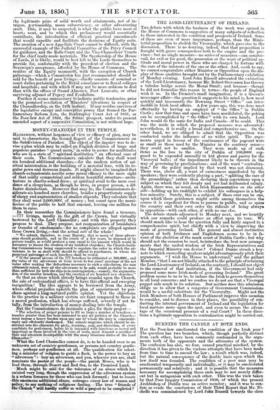.1.111, LORD-LILT/TENANCY OF IRE.LAND.
THE debate with which the business of the week was opened in the House of Commons is suggestive of many subjects of reflection to those interested in the condition and prospects of Ireland. Some of these are oven of more importance, perhaps, than the Minis- terial proposition to abolish the Viceroyalty, which gave rise to the discussion: There is no denying, indeed, that that proposition is fraught with grave consequences both to the empire and the pro- vince: but no single measure—no series of measures—can counter- vail, for evil or for good, the possession or the want of political ap- titude and moral power in those who are charged by fortune with the care of the interests of the one or the other. And, sooth to say, we cannot congratulate either Minister or Opposition upon the dis- play of those qualities brought out by the Parliamentary exhibition of Monday evening. Lord John Russell advocated the extinction of the Lord-Lieutenancy, because Mr. Robert Stevenson has thrown a tubular bridge across the Menai Strait ; and because—though he did not formulize this reason in terms—the people of England Iwish it so. In the Premier's small imagination, it is a Queen's- , messenger affair—the question it suggests to his mind is, how most quickly and incessantly the Downing Street" Office" can inter- meddle in Irish local affairs. A few years ago, this was done most effectually by having an employe of "the Office" in Dublin Castle ; now that time and space have been annihilated, the poking can be accomplished by "the Office" with its own hands. Lord John would do the same for India and Canada—if-he could. This was the mode in which the proposed measure was advocated : nevertheless, it is really a broad and comprehensive one. On the other hand, we are obliged to admit that the Opposition was conducted under the influence uence of no wider spirit. The argu- ments urged in favour of the continuance a the pageant were as small as those used by the Minister in the contrary sense— they could not be smaller. They were made up of suoli items as the loss to the city of Dublin of 100,0001. sup- posed to be expended annually in kid gloves and pastry for the Viceroyal balls ; of the impediment likely' to be thrown in the way of governing by proclamations ; and, of the word "centraliza- tion," for the policy implied by that word was not discussed. There was, above all, a want of earnestness manifested by the speakers ; they were evidently playing a part, "splitting the ears of the gronndlings," rather than declaring their convictions upon a subject on which they felt deeply and yet had deliberated calmly. Again, there was, as usual, an Irish Representative on the other side—holding up his rushlight to exhibit his colleagues-in a help- less minority. Surely, this is a subject, if there ever can be one, upon which those gentlemen might settle among themselves the course it is expedient for them to pursue in public, and so spare the country and their own order the ridicule of being always in opposition—with each other' if with no one else. The debate stands adjourned to Monday next, and we heartily wish our remarks could produce an effect upon its tone. We should much like to hear the question fully, and fairly argued in a comprehensive spirit, but chiefly with a view to improving the mode of governing Ireland. The general and almost instinctive opinion of both Irishmen and Englishmen seems to be in fa- vour of the abolition of the mock court of Dublin Castle ; but why should not the occasion be used, to introduce the best new arrange- ments that the united wisdom of the Irish Representatives and the Imperial Ministry can devise ? Colonel Dunne struck a key- note to which succeeding speakers might advantageously pitch their arguments. "I wish the House to understand," said the gallant Member, "that I am not blindly attached to, the principle of retaining the Lord-Lieutenancy of Ireland; on the contrary, I should not object to the removal of that institution, if the 'Government had only proposed some more Irish mode of governing Ireland." The great problem seems to us to be, to induce the Irish to govern themselves m all local concerns ; and we confess we do not see that a Viceregal puppet aids much in its solution. But neither does this admission oblige us to allow that a congeries of Government Commissions would be a useful substitute for the Viceroyalty. Might not the Irish Members of both Houses of Parliament improve this occasion to consider, and to discuss in their places 'the possibility of con- ducting the internal government of Ireland and the legislation for local matters more upon the spot, and even to secure the advan- tage of the occasional presence of a real Court ? In these direc- tions a legitimate opposition to centralization might be carried out.


























 Previous page
Previous page